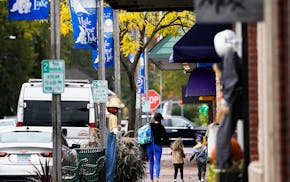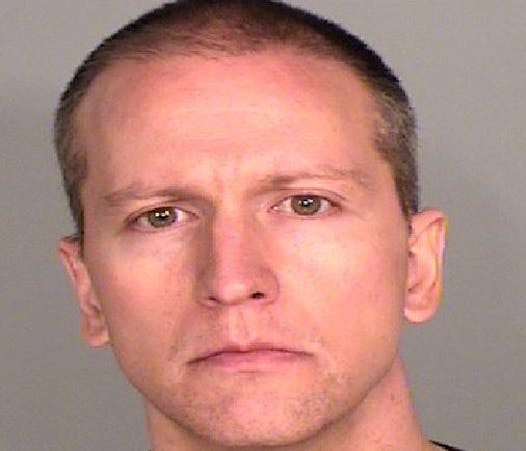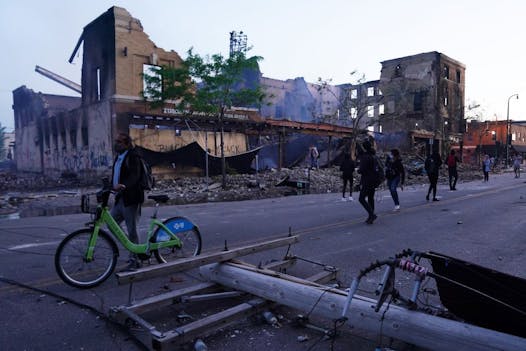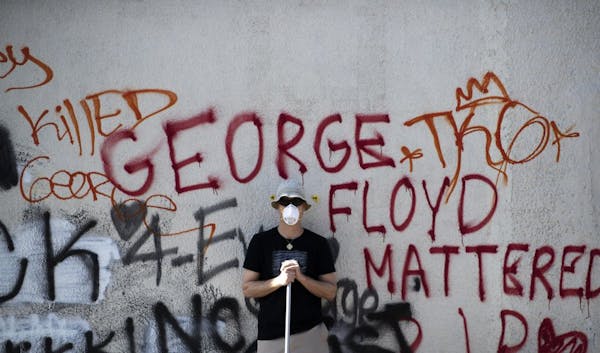Hennepin County Attorney Mike Freeman on Friday announced murder and manslaughter charges that accuse a fired Minneapolis police officer of killing George Floyd — an act caught on video and seen around the world, sparking days of violent demonstrations across the Twin Cities.
Derek Chauvin, 44, was arrested late Friday morning and charged with third-degree murder and second-degree manslaughter four days after he pinned his knee on Floyd's neck for nearly nine minutes Monday at the intersection of E. 38th Street and Chicago Avenue as the unarmed and handcuffed man told him he couldn't breathe.
Chauvin is being held in the Ramsey County jail on $500,000 bail. The agency that led the investigation resulting in the charges, the state Bureau of Criminal Apprehension, late Friday explained why he wasn't jailed in the county where he was charged.
"The BCA communicated with the Hennepin County Sheriff's Office, which was dealing with potential threats to their facilities at the time of the arrest," BCA spokeswoman Jill Oliveira told the Star Tribune. "They directed us to book him into the Ramsey County jail."
He is the first white officer in Minnesota to be criminally prosecuted in the death of a black civilian. The maximum sentence for third-degree murder is 25 years; the maximum for second-degree manslaughter is 10 years.
WCCO-TV reported Chauvin's wife, Kellie, will seek a divorce and published a statement attributed to her saying she is devastated by Floyd's death.
Bystanders begged Chauvin and three other officers at the scene to relent, but their calls went unheeded as the 46-year-old Floyd grew unresponsive and later died.
The three other officers involved in Floyd's curbside detention were also fired, but they have not been arrested or charged. Freeman said he anticipates the other officers will be prosecuted, but he declined to speculate on the counts or when they would be filed.
Freeman explained that Chauvin was the first of the four charged because "we felt it was important to focus on the most dangerous perpetrator. I must say this case has moved with extraordinary speed."
The criminal complaint, citing the autopsy, said that Floyd did not die from strangulation but a combination of being restrained along with various underlying medical conditions including heart disease and hypertension.
Chauvin's attorney, Tom Kelly, declined to comment about the allegations against his client, who remains jailed with his first court appearance yet to be scheduled. Minneapolis Police Officers Federation President Lt. Bob Kroll did not respond to messages seeking comment.
Asked whether two nights of protest that destroyed dozens of buildings in Minneapolis and St. Paul factored into his charging decision, Freeman said the move was based on evidence, which includes video, witness statements, a preliminary medical examiner's report and discussions with an expert.
Freeman had said at a news conference Thursday that such investigations take time, and he called for patience. He said his office has been flooded with as many as 1,000 calls a day and countless e-mails demanding charges.
"But my job in the end is to prove that he violated criminal statute," he said. "And there is other evidence that does not support a criminal charge. We need to wade through all of that evidence to come to a meaningful determination."
Freeman later issued a statement clarifying "that it is critical to review all the evidence because at the time of trial, invariably, all that information will be used."
Asked Friday what had changed to clear the way for charges, the county attorney said evidence his office received as late as Thursday afternoon played a role. He declined to elaborate.
Disclosure of Chauvin's arrest before the charges were filed came from state Public Safety Commissioner John Harrington during a news conference, where he called Floyd's death at the hands of police a "murder. … That's what it looked like to me."
According to the criminal complaint: Police were called after Floyd was suspected of passing a fake $20 bill at the Cup Foods store. Officers Thomas Lane and J Alexander Kueng approached Floyd, who was in a car with two other people.
Lane pointed his gun at Floyd, who placed his hands on the steering wheel. Lane returned his gun to the holster and pulled him out of the car. Floyd initially resisted being handcuffed, but once cuffed was compliant. When they tried to put Floyd in the squad car, he stiffened and fell to the ground and said he was claustrophobic.
Chauvin then arrived with his partner, Tou Thao, and the four officers struggled to place Floyd in the squad car. Chauvin then pulled Floyd out of the vehicle, and the 6-foot-6 Floyd again went to the ground while still handcuffed, the complaint read.
As two officers held Floyd's back and legs, Chauvin had his knee on Floyd's neck, the charges continued.
Floyd then began repeating "I can't breathe" along with "Mama" and "please," the charges read. One or more of the officers said to Floyd, "You are talking fine" as he continued moving back and forth.
None of the three officers moved from their positions, according to the complaint. Lane asked whether they should roll Floyd on his side.
"No, staying put where we got him," Chauvin allegedly replied.
"I am worried about excited delirium or whatever," Lane said.
"That's why we have him on his stomach," Chauvin said.
The three officers continued to hold Floyd down.
"Excited delirium" is a controversial condition, often related to drug use, that can allegedly lead to violence or physical agitation.
Thao can be seen in the video standing watch as Chauvin knelt on Floyd's neck. Thao also rebuffed bystanders who begged the officers to relent and to check Floyd's pulse after he went limp.
Paramedics and emergency room staff at HCMC worked for nearly an hour to revive Floyd, who arrived with no pulse. He was pronounced dead about 9:25 p.m.
Freeman declined to say whether any of the former officers have given a statement to investigators.
An attorney representing Floyd's family called the arrest and charging of Chauvin "a welcome but overdue step on the road to justice."
Benjamin Crump's statement went on to say he and Floyd's survivors expected a more serious charge and the arrests of the other officers.
"We call on authorities to revise the charges [against Chauvin] to reflect the culpability of this officer," the statement continued. "We fully expect to see the other officers who did nothing to protect the life of George Floyd to be arrested and charged soon."
The swiftness of the charges came as activists, politicians and the public had been calling for arrests and prosecution of the former officers all week while large sections of Minneapolis and St. Paul were thrust into sometimes violent protests that devolved into looting, arson, theft and property damage.
Activists and community members have long complained that suspects are often arrested as soon as the same day of a death and charged within 24 hours, a sentiment echoed by the Rev. Al Sharpton on Thursday afternoon when the national civil rights activist visited the site of Floyd's detention.
Mayor Jacob Frey released a statement after Chauvin was charged that said "what's happened in Minneapolis is bigger than any one city and any single event. For our black community who have, for centuries, been forced to endure injustice in a world simply unwilling to correct or acknowledge it: I know that whatever hope you feel today is tempered with skepticism and a righteous outrage."
U.S. Sens. Amy Klobuchar and Tina Smith, along with 26 colleagues, called on the Department of Justice "to investigate the patterns and practices of racially discriminatory and violent policing in the Minneapolis Police Department."We must work toward justice for the community, which means ensuring that the MPD accounts for and eliminates any unconstitutional police practices."

Why you should donate clothing: It (probably) won't end up at the dump
4 are now charged in inside job armed robbery of Hopkins grocery store that netted $45K
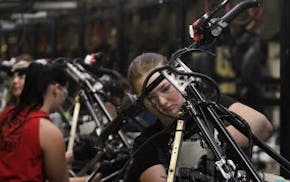
Minnesota added thousands of jobs in March but worker shortage still an issue
Private prison van driver, accused of raping St. Paul woman he was transporting, gets 30 years for similar attacks
